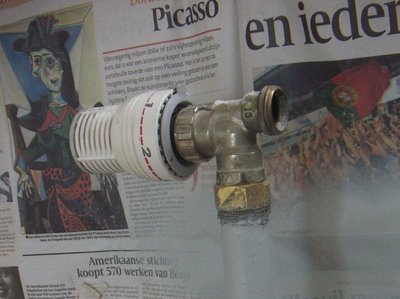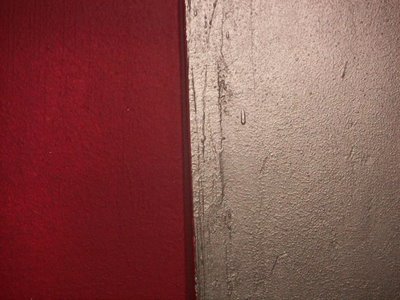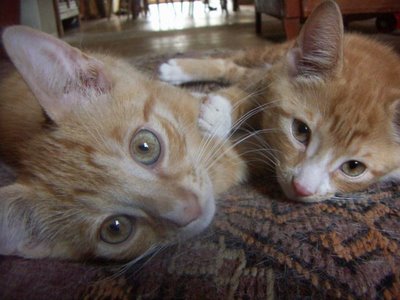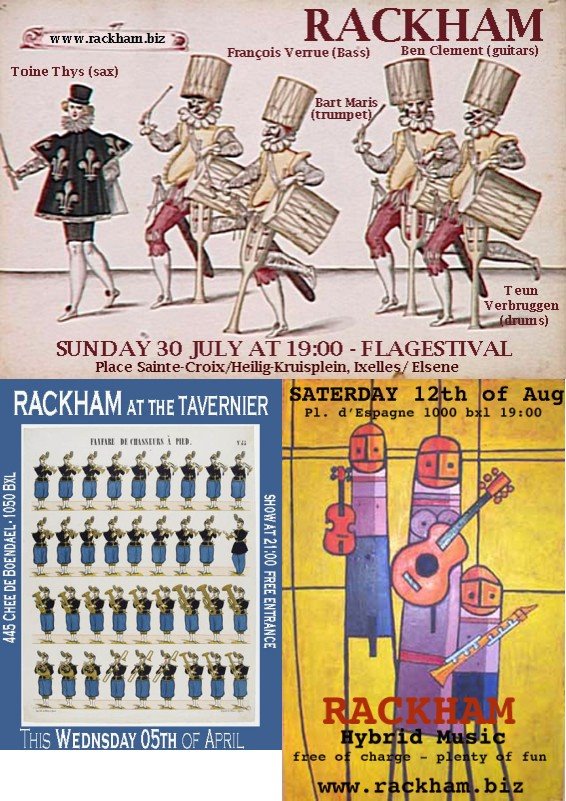
If you've never been to Ornette Coleman's house (I'd never even heard him speak), now you can at least see a bit of it, thanks to this interview video by the French magazine L'Express. The first part is a solo improvisation.

[Some people] have been disappointed that the improvised material did not have the same intent and fervor that they are used to hearing from other people who work in a similar vein. To them I would say that they are used to people improvising with disregard for the written material, which is an anathema to me.
Too often I have heard concerts or recordings where written material is played and then the improvised material starts . . . and there is little or no connection between them. I find this lack of connection tiresome - - I often question the need for the written material if the players do not tie their improvisation into the piece at hand.




today the act of fusing jazz with other forms of music is so essential — and so natural — to what jazz musicians do that it typically involves more than one fusing at the same time.
(...)
Naked City played super-tight sets that sounded like they were controlled by a very hip two year-old with a remote control in hand: reggae crosscut to Bugs Bunny music crosscut to death metal crosscut to film noir soundtrack. In that group's first disc from 1989, the gauntlet of the new fusion had been thrown: jazz musicians could now play absolutely anything in their way, but only best would be able to make the great crush of American variety truly their own.
(...)
[Horvitz and Previte's] relatively early work had a characteristic "fusion" sound, but it was hardly the sound of squealingly precise guitars or funked-out jams. Taking their cue from soundtrack music, Camera and Claude's were works of melody, atmosphere, and arrangement, with rock and pop rhythms taking their rightful place beside swing as valid ingredients in a "fused" American music. That these musicians improvised with authority and within a certain musical vocabulary meant that it was still "jazz", but the word was clearly being bent in new ways.
Their invention is characterised by (a) the hybridisation of disparate genres (free jazz inherited from the Ornette Coleman generation, punk's abrasiveness, Balkan folklore, the klezmer tradition), (b) the integration of instruments and phrasing borrowed from noise-rock (echoing and distorted guitar) or chamber music (cello), (c) situating improvisatory spaces within ambitious thematic structures (generally refusing the classic theme-solos-theme form), and (d) iconoclastic attitudes (from excessive volume to shocking album covers). This New York scene thus established an expressive space that linked the jazz explosion of the 1960s (Coleman, Dolphy, Mingus, Coltrane, Ayler), contemporary chamber music (Boulez, Ligeti, etc.), aleatory explorations (Cage), the noise subculture (Japanese hardcore, Sonic Youth), funk (Prince), jazz-rock (Mahavishnu Orchestra) and 1970s European Free Music (Brötzmann, ICP) and even prog-rock (Robert Wyatt).
The scene is characterised by its very fragmentation: there is no dominant voice, no clearly imposed creative method - which seems to me an excellent environment to create music. Now that the more or less major upheavals of the modernist movement have taken place, we can get to making music with everything at our disposal, instead of being limited by one or the other philosophy that imposes a narrow conception of art or music... This conception of "freedom" is complex, however... For me, to be postmodern means to be "free" to draw on any idea and any influence, while being "free" to displace them into a different context, to mix them in a unique way and to recombine them with different ideas.Tim Berne brings some grist to the current "who needs a label" discussion (cf. visionsong's interesting, personal and pragmatic take), even though his interview dates back to 1997, the CD-selling heyday:
I've had a lot of disappointments with labels. Most of the time, even if you sign with a major, the discs end up wasted, the company goes bankrupt or is sold. Musicians are used to being insistent and resilient, they hang on even when the financial conditions are bad. But the major label employees only know one way of selling CDs, which is to place them in stores and wait. They do that for a month or two, then they get bored. They can't think on a smaller scale, adopt a more grassroots approach. They're hooked on the system and can't see beyond it. To promote a CD, they just sign a check for $50,000 and put an ad in Down Beat or Musician.
By starting my Screwgun label in 1997, I sought to reach people more directly, because we play all over the world and people always want to know where they can get our CD. That tells me that distributors aren't doing their job. I didn't want to go on like that, so I take my albums with me to sell after concerts. You can also get them by mail or order them from the web site, alongside the distribution networks in the stores. Also, I didn't want to be subjected to other people's calendar and whims: this way, we make a record, we put it out and we move on to the next one. It's worked very well, it's totally viable. It was easy enough, except that it's a huge investment of time and energy.
Mwanji Ezana of be.jazz renown has posted a spectacular review of artsongwriter Corey Dargel's debut CD, Less Famous than You -- a thoughtful, colorful and detailed analysis I'd be giddy to have written. Do not miss it. - Steve SmithI'm blushing (and believe me, that takes some doing). The review in question is just below.
The Care Bears [on Fire] —singer-guitarist Sophie Kasakove, 11, bassist-singer Lucio Westmoreland, 11, and drummer-singer Isadora “Izzy” Schappell-Spillman, 10, all classmates at Park Slope’s Berkeley Carroll SchoolThat's where I went to first and second grades. Despite piano lessons and a futile attempt to count my father's LPs (I stopped after a few hundred) that was probably the seed of my collector-ism, I was never featured in a magazine of any description. By the time I was the CBoF's age, I was going to Masaï Mara rather than Fairway (whatever that is), so I don't feel too underpriveleged.

In general that's where I find my inspiration, in life. One thing I know for sure my inspiration is life and not death. It's interesting, that I know for sure from those few years of war [in Yugoslavia], you know, there was death all over the place—nothing artistic was coming out of this. But life! Ahhh! You know, colors, people, food and nature, smells, the sounds of course. I'm very, how do you say, sensitive to it?
(...)
[For Xenophonia] I just took more time to work on the sound—the vertical dimension—the colors, the profundity, which sound goes where. For example, on some of the instruments I play, I had this set-up which was acoustic piano, Fender Rhodes and customized Fender Rhodes which gives me quite a lot of possibilities sound-wise— mixing the piano with Fender Rhodes... In general, about the performance, we were all working on textures and sounds more than who's going to be the fastest, that's where the difference for me is.
(...)
I bought my first Fender Rhodes in ' 81 in a bar in a village next to Belgrade and the funny thing is that a few years ago, knowing that in Belgrade I can eventually find a Fender Rhodes cheap I called my brother to try to find something there and he found actually the same village. But he found just the shell of a Fender Rhodes and just a few keys.
(...)
[W]hat I did was I started buying all the parts on e-bay and basically I had different vintages and different years and while I was putting this thing together I kept all the imperfections. I actually wanted every note to sound different because it was not the point to have to have just another Fender Rhodes—I was dreaming about having an instrument that I could tamper with for Arabic scales or scales coming from cultures other than European for quite some time.
With a piano you cannot do it because you have to have your own tuner. It's impossible. But I thought finally, that's what I'm going to do with this guy; it's easier to learn how to tune it, instead of having to find some effects, distortion, treating it like a guitar and thing like this you know. That's why I call it “xenophone.” Why? Besides the connection to the name of the record—it's the reaction I get every time I plug it in and play something on it and I observe the reaction from most of the people—it’s like some stranger, some naked stranger has walked in. Ahh!! What is this?!
Scott Colley told me a few years ago that before each set in the Village Vanguard Jim Hall would take a mike and say something, you know, good old man, decent, jazz guitar legend and saying things like: “I’m listening to so many different styles of music and find myself still discovering things. Recently I bought a record of the Dixie Chicks. It’s amazing what they do.” And the people die laughing. And then: “Seriously, I am not used to living in a fascist regime.” This at the Village Vanguard. But you’ll never hear a word about it in any of those “jazz” newspapers, but what you will see is “My Favourite Things’ questionnaires to Kenny Barron. It’s like an interview:
Q: Which is your favourite watch?
Kenny Barron: Well, I have a Rolex…
Q: “What’s your favourite color?”
Can you imagine this? Toshiko Akiyoshi and Lew Tabackin!
Q: What is your favourite wine?”
A: Oh, Chateau Ikan, 1929—they never let you down.
They are serious! You guys are serious, one bottle is $6,000!...
Besides that then you have the thing that middle class gigs are non-existent. You know most of us, we live from the gigs which are financially speaking from $1,000 to $10,000 range, you know it depends where you are, smaller or bigger hall, bigger venue. You know I’m speaking about bands, band price. And this doesn’t exist; they have from zero to $1,000, which is….pay a band with this! And then you have these tremendous numbers of thousands of dollars from $10,000 on for Sonny Rollins and Keith Jarrett and people like this.
So this has completely killed the economy that the music can generate... The reverse side of the coin is if you find yourself in front of saxophonist Joe Lovano, he is going to blow your mind! You’re going to get scared. So that’s the other side of the coin, music artistry, the giants that are still alive and kicking. That’s not just a legend, it is true. It’s happening.
(...)
I just love hearing all these different things piano-wise, just on the one hand to remember the lost colors of this instrument because there is a tendency nowadays growing into a certain pattern of piano playing that most of the pianist are using and they just forget about these things for example, Errol Garner or Earl Hines and guys like this, the way they were using this instrument—so all these colors are a bit left aside. So, Duke Ellington is one of my favorite piano players because he's the one I like listening to at almost any moment of the day, so fresh and so mysterious and his attitude so...hip!
You wonder, too, about the degree to which Big Boi knows all this about his old friend, and knows that the key to staying together is to let André talk about leaving all he wantsIt'd be bad enough on its own (the old "musicians aren't self-reflexive and therefore can't possibly be as insightful as I am" move), but is extremely puzzling after multiple assertions by the author himself that Big Boi is fully cognizant of the situation.
Part of the psychology of collecting jazz is that we fans covet not only the music but also the record labels.I semi-agree with this, contra Darcy's disdain for a world "where listeners (not just promoters) actually care about what label you're on." I still think that a label's role as gatekeeper/beacon/handy collection organiser is helpful. Come to think of it, a label is a little (and, today, increasingly) like a dematerialised record store.

...Groundbreaking, it gave young British jazz bands the guts to label themselves like rock bands and to stretch beyond their comfort zones.Actually, I'm listening to Joey Baron's Tongue In Groove for the first time as I type this, and it sounds in spots like a precursor to Polar Bear.
Very few jazz groups today set out to mess with your head. You know, get inside there, push the furniture over, chuck things out of the window and generally make a nuisance of themselves...
1 Miles Davis Kind Of Blue
2 John Coltrane Love Supreme
3 Ornette Coleman Shape of Jazz to come
4 Bill Evans Trio Sunday at the Village Vangaurd
5 Sonny Rollins Saxophone Colossus
6 Thelonious Monk Brillant Corners
7 Charles Mingus Ah Um
8 Charlie Parker Savoy Recordings
9 Miles Davis Bitches Brew
10 Keith Jarrett Köln Concert
11 Coltrane Giants Steps
12 Eric Dolphy Out To Lunch
13 Louis Armstrong Complete Hot 5 and 7
14 Duke Ellington Blanton-Webster Band
15 Mahavishnu Orchestra Inner Mounting Flame
16 Albert Ayler Spiritual Unity
17 Herbie Hancock Head Hunters
18 Dave Brubeck Time Out
19 Ornette Coleman Free Jazz
20 Weather Report Heavy Weather
21 Ahmad Jamal But Not For Me
22 Jerry Roll Morton Volume 1
23 Frank Sinatra Songs For Swingin' Lovers
24 Wes Montgomery The Incredible Jazz Guitar
25 Modern Jazz Quartet Fontessa
26 Bud Powell The Genius of Bud Powell
27 Cecil Taylor At The Café Montmartre
28 Art Blakey Moanin'
29 Herbie Hancock Maiden Voyage
30 Getz/Gilberto Getz/Gilberto
31 Pat Metheny Bright Size Life
32 Jimmy Smith A New Sound
33 Jan Garbarek Afric Pepperbird
34 Woody Herman Thundering herds
35 Duke Ellington At Newport
36 Ella Fitzgerald Sings The cole Porter Songbook
37 Charles Mingus The Black Saint and the Sinner Lady
38 Cannonball Adderley Somethin' Else
39 Lifetime Emergency
40 Billie Holiday At JATP
41 Chick Corea Return To Forever
42 Stan Getz Focus
43 Miles Davis Sketches of Spain
44 George Russell Jazz Workshop
45 John Coltrane Impressions
46 Andrew Hill Point Of Departure
47 Sonny Rollins The Bridge
48 Sun Ra Heliocentric Worlds
49 Dizzy Gillepsie Shaw Nuff'
50 Lennie Tristano Tristano
51 John Zorn Naked City
52 John McLaughlin Extrapolation
53 Pharoah Sanders Karma
54 Lester young Lester Young/Buddy Rich Trio
55 John Coltrane Ascension
56 Art Ensemble 0f Chicago A Jackson In Your House
57 Horace silver Song For My Father
58 Clifford Brown/Max Roach Quintet
59 Coleman Hawkins Body And Soul
60 Peter Brötzmann octet Machine Gun
61 Miles Davis Birth Of The Cool
62 Count Basie The Atomic Mr. Basie
63 Archie Shepp Four For Trane
64 Brad Meldhau Art Of The Trio vol.3
65 Gerry Mulligan Gerry Mulligan Quartet
66 Gil Evans The Individualism Of Gil Evans
67 John Handy Live At Monterrey
68 EST From Gargarin's Point Of View
69 Stan Tracey Jazz Suite Inspired By Dylan Thomas
70 Dollar Brand African Marketplace
71 Wayne Shorter Speak No Evil
72 Thelonious Monk Genius Of Modern Music vol.1
73 Roland Kirk Rip, Rig And Panic
74 Herbie Hancock New Standard
75 Oscar Peterson Night Train
76 Charles Lloyd Dream Weaver
77 Art Tatum The Genius Of Art Tatum No. 1
78 Betty carter An Audience With Betty Carter
79 Oliver Nelson Blues And The Abstract Truth
80 John Surnam Tales of Algonquin
81 Eberhard Weber Colours of Chloe
82 Steve Coleman and 5 elements Tao of Mad Phat
83 Diana Krall Love Scenes
84 Anthony Braxton For Alto
85 Kryztof Komeda Astigmatic
86 Steps Ahead Steps Ahead
87 Django Reinhardt Retrospective 34-53
88 Joe Harriot-John Mayer double Quintet Indo-Jazz Suite
89 Jackie McLean Let Freedom Ring
90 Charlie Haden Liberation Music Orchestra
91 MIC MIC
92 Sarah Vaughan Sarah Vaughan
93 Jan Johanssen Jazz Pa Svenska
94 Cassandra Wilson Blue Light Til Dawn
95 Wynton Marsalis Black Codes
96 Medeski,Martin and Wood Combustication
97 Tomasz Stanko Soul of Things
98 Courtney Pine Journey to the Urge Within
"...A pied piper who led British jazz out of the trough of despond after its brilliant flowering in the 1960s..."
99 The Bad Plus These Are The Vistas
100 Polar Bear Held On The Tips Of Fingers


Here is just a list of truly inspiring artists who influenced Rackham's music in one way or another: Stevie Wonder, David Bowie, Radiohead, Calexico, Jim Black, Chris Speed, Brasilian Girls, Brian Blade Fellowship, Madonna, Jeff Buckley, Nic Thys, Björk, Ryan Scott, the Bloomdaddies, Nirvana, (more to come..





Bebop, swing, and the blues are either the Holy Trinity, or dusty relics that are relegated to their time in history.A sad state affairs, and one that doesn't correspond to the reality of progressive jazz of any era: Steve Coleman, Jason Moran, Greg Osby (his latest CD, Channel Three, is quite good), Mal Waldron, Steve Lacy, Andrew Hill, Monk (although, there is that "we changed all that" quote)...
I was fortunate enough to have Jeff as a teacher and mentor, and we often talked about avant-garde/free music; I got a balanced education that way.I think that this applies to any education: your teachers aren't going to spoon-feed you everything (no matter how much you pay), either because of personal bias or cirricular strictures.
Luckily, I got involved with CKUT my second year of university, and their library houses a whole world of improvised music not much discussed in the faculty


How to Suppress Discussions of Racism[via hip hop music dot com]
1. Control what your audience sees.
2. Attack the person, not the argument.
3. Argue against straw men.
4. Deflect attention away from the specific criticism.
5. Racism, however ugly, is better than the alternative.
6. Prove your opponent has mistaken some other quality for racism.
The backdrop switches to an LED display, flashing with the words Buy It, Use it, Upgrade It... visually representing the intro to "Technologic". The audience erupts, but that's more down to Busta Rhymes sampling the intro on current single, "Touch It", rather than its status as a Daft Punk classic.
The LED switches to strip-lighting synchronised with the pounding beats of "Technologic", and it seems that Daft Punk are Kraftwerk's heirs apparent.
With the type of cold-blooded capitalism that is practiced in western uncivilization, terrorism is an inescapable consequence. This country cannot be involved in wholesale corporate imperialism like it is and not expect some type of blowback.While I don't agree with such karmic explanations, I find Spins's own spin at least as fallacious:
What we are experiencing “blowback” for is the fact that we allow musicians like Shipp the freedom of artistic expression... We are experiencing “blowback” because we allow women like Joanne Brackeen to perform, teach students, and show her face in public, not veiled beneath a burqa. We are experiencing “blowback” because we let people worship as they please, or even live a completely secular life.The Jazz Times website hasn't been updated yet, but as it's highly unlikely I'll be buying the issue, I was wondering if anyone could share more of what Shipp and others said.
no photographers, no smoke, no noise, no movement, no late-comers, no drinks, no cooking smells, no other bands, etc.The usual. In 2006:
two class S Mercedes (one for him, one for his sidemen), free of tobacco smells and driven by professional chauffeurs. Keith Jarrett doesn't appreciate festival volunteers. He also excluded them from his concert, after having deprived them of a warm meal (still because of the kitchen odours).And then, a dessert crisis: the one on the menu didn't suit him, so someone was dispatched to get a charlotte au chocolat from a local restaurant. This led to a 13 minute delay:
Nothing serious, except that [he] had demanded that all spectators be in their seats by 8:45, with the concert beginning at 9:00 (under a closed tent)...You'll be unsurprised to learn that the writer didn't enjoy the concert.
...Volunteers armed with bagfuls of mineral water bottles went down the aisles (since the bars were closed) to rehydrate the suffocating audience.
"One time we got into the train station and there was a driveway next to the path when you walked by the station. We had our bags lined up on the sidewalk next to the tracks and some guy with a truck came along and ran over our bags."+
Jones' eyes grow large and fill with fire.
"We just had to take that stuff. What are you going to do? You were in the deep South, and all they wanted was an excuse to beat you or lynch you. If I had been like some guys -- hot-tempered -- I might have gotten killed."
(...)
"After [Art Tatum's] last set, we'd go hang out at some restaurant or private home and play until daylight," says Jones. "I sat right next to him. Or next to the case of Pabst Blue Ribbon beer. Nobody could get between him and his beer.
"I'd watch his hands, but you couldn't learn very much from watching because his hands moved so fast. You'd listen to the harmony and what he was playing and you began to hear certain things and after a while you recognized what he was doing and then why he was doing it, which was more important."
(...)
"Even today, I don't think I'm a full-fledged bop player," he says. "When I'm improvising in that vein, I'm reaching out for it. I'm trying to capture the essence of it."
(...)
"When we played New York, every great pianist from George Shearing to Kenny Barron would come in," says [drummer Dennis] Mackrel. "Hank was very subtle, but when someone of a high caliber came in, he'd get more advanced harmonically or rhythmically. It would always go up a notch. Not to say, 'Look at me,' but just to let them know he was still the cat."